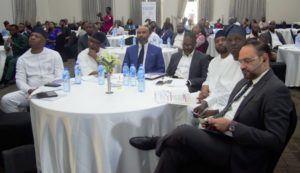

By Prof. Nentawe Goshwe Yilwatda
Ladies and gentlemen, esteemed guests, and fellow stakeholders in Nigeria’s digital economy.
I stand before you today with a heart filled with pride and gratitude as we gather to celebrate the leaders and milestones in Nigeria’s digital economy. This event marks a pivotal moment in our nation’s journey towards embracing the digital era, and it is an honour to be among the distinguished individuals recognized as the 50 Most Valuable Players (MVPs) in Nigeria’s digital economy.
RELATED: 50 Most Valuable Personalities: Collaboration across sectors will drive Nigeria’s digital economy, says Nentawe Yilwatda
First and foremost, I would like to extend my deepest appreciation to the organizers of this remarkable event. Your dedication, vision, and tireless efforts have brought us all together under one roof to shine a spotlight on the trailblazers who are driving innovation, creating opportunities, and shaping the future of our nation’s economy through digital transformation.
To my fellow MVPs, each one of you represents the epitome of excellence, resilience, and ingenuity in your respective fields.
The Fourth Industrial Revolution (4IR) presents a transformative opportunity for Nigeria to harness the power of emerging technologies
Today, we will speak to our needs of leveraging digital data and knowledge as critical factors of production to create opportunities for young people in online buying and selling, digital services, digital products, digital platforms, and many more in today’s interconnected world.
According to Worldometer in 2024, Nigeria has a population of about 227 million people, making it the sixth-largest in the world and the most populous country in Africa. If you were to shake hands with every Nigerian for just one second, it would take you more than 7 years and 3 months to greet the entire nation! Yet, technology has provided platforms to connect these millions of Nigerians in seconds.
Moreover, Nigeria boasts the largest economy in Africa, with a GDP of $473 billion in 2022 (World Bank data). The country’s youth population, aged 15 to 35 years, is estimated to be a staggering 64 million, one of the largest concentrations of young people globally. This youthful demographic, coupled with Nigeria’s economic might and increasing digital adoption, positions the country as an ideal candidate to develop a robust digital economy.
The Fourth Industrial Revolution (4IR) presents a transformative opportunity for Nigeria to harness the power of emerging technologies such as the Internet of Things, machine learning, artificial intelligence, and robotics to revolutionize various sectors, from agriculture and healthcare to manufacturing and security.
Nigeria has emerged as a significant player in the blockchain and cryptocurrency space, with approximately 22 million citizens owning digital currencies.
Some of the Opportunities Created by the Digital Economy in Nigeria.
Our thriving digital economy is having a far-reaching impact on different sectors of our economy. It has catalysed waves of innovative businesses that is propelling the nation toward economic prosperity and lifting millions of young people out of poverty. Some of these sectors are:
Transportation and Mobility Services: The rise of digital platforms like Bolt, Uber and others has revolutionized the transportation and mobility services in Nigeria. Within just seven years, Bolt has facilitated over 250 million rides across the country. Notably, Bolt’s rapid growth can also be attributed to its team of young employees, with an average age of 26, who have innovatively facilitated an exponential growth in its driver force from 152 drivers at inception to over 35,000 drivers presently (Business Day, December 17, 2021).
Gaming and Online Betting: Nigeria’s gaming and online betting industry is thriving, with a massive user base of approximately 70 million youth participating daily. This sector generates a staggering N8 billion (around $17.5 million) in daily transactions, underscoring its economic significance.
E-commerce: The e-commerce market in Nigeria is rapidly expanding, driven by an estimated 76.7 million online shoppers. Between 2017 and 2022, the number of Point-of-Sale (POS) terminals in Nigeria grew significantly, from around 155,000 terminals in 2017 to roughly 1.8 million as of March 2023 (Nairametric, 2023). This growth in POS infrastructure has facilitated an increase in both the value and volume of POS payments, further fueling the growth of the e-commerce.
Remote Work: Approximately 18% of Nigerians work remotely, tapping into the global remote jobs market. This global market was valued at $19.79 billion in 2023 and is projected to reach a staggering $100 billion by 2032, presenting lucrative opportunities for Nigeria’s digitally-skilled workforce.
Dating and Related Services: The dating and “hookup” services market in Nigeria is expected to attract 4.1 million users by 2028, with an estimated $22 million projected to be spent on these services in 2024 alone.
Blockchain and Cryptocurrencies: Nigeria has emerged as a significant player in the blockchain and cryptocurrency space, with approximately 22 million citizens owning digital currencies. In 2022, the country witnessed a remarkable turnover of $56.7 billion in cryptocurrency transactions. Moreover, around 10% of payroll withdrawals from contracts in Africa are facilitated through cryptocurrencies, underscoring the growing adoption of digital finance.
While these developments are encouraging, challenges persist in Nigeria’s digital economy landscape. Inadequate infrastructure, particularly in rural areas, high data costs, and cybersecurity concerns continue to hinder widespread adoption and growth. Additionally, regulatory frameworks and policies need to be updated to support innovation and entrepreneurship in the digital space.
Opportunities for Young People
Some of the opportunities available for young people in the digital economy space are:
Entrepreneurship and Startups: The booming digital economy in Nigeria presents a fertile ground for young entrepreneurs to launch innovative startups and digital businesses. From e-commerce ventures and fintech solutions to digital content creation and marketing, the opportunities are vast. Successful Nigerian digital startups like Paystack and Flutterwave, founded by young entrepreneurs, serve as inspiration for aspiring founders.
Young entrepreneurs can leverage emerging technologies like artificial intelligence, machine learning, and the Internet of Things to develop cutting-edge solutions across various sectors, including agriculture, healthcare, manufacturing, and security.
Nigeria’s digital economy presents a wealth of opportunities for the nation’s youth to leverage on their creativity, digital skills, and entrepreneurial spirit
Agribusiness: While Nigeria’s agricultural sector has untapped potential, the nation’s heavy reliance on imports is evident. Between 2016 and 2019, Nigeria spent a staggering N3.35 trillion (approximately $7.3 billion) on agricultural imports, while exports remained meager at N803 billion (around $1.8 billion). Leveraging 4IR technologies such as precision agriculture, smart farming, and data analytics could potentially revolutionize this sector, boosting productivity and efficiency.
Employment and Freelancing: The rise of remote work and the gig economy has opened up new avenues for employment and freelancing opportunities for Nigeria’s youth. With the global remote jobs market expected to reach $100 billion by 2032, young Nigerians can leverage their digital skills to secure lucrative remote roles in areas such as web development, digital marketing, virtual assistance, and many more.
Furthermore, as companies across sectors embrace digital transformation and 4IR technologies, there is an increasing demand for professionals with specialized digital skills, such as data analysts, cybersecurity experts, software developers, robotics engineers, and artificial intelligence specialists. Young Nigerians can position themselves for these high-growth job opportunities by acquiring relevant digital skills and staying abreast of emerging technological trends.
Digital Innovation and Problem-Solving: Nigeria’s young population can leverage digital technologies to develop innovative solutions that address local challenges in sectors like agriculture, education, healthcare, transportation, and security.
Initiatives like hackathons, innovation challenges, and incubation programs provide platforms for young people to collaborate, ideate, and bring their digital solutions to life. By harnessing their creativity and digital skills, young Nigerians can contribute to the nation’s development while creating economic opportunities for themselves.
Enabling Factors for Creating Digital Opportunities for Young People
To fully capitalize on the opportunities presented by the digital economy and the Fourth Industrial Revolution, several enabling factors need to be addressed:
- Digital Literacy and Skill Development: Equipping Nigeria’s youth with relevant digital skills is crucial. This includes not only traditional skills like coding, data analysis, and cybersecurity but also emerging skills in areas like artificial intelligence, machine learning, robotics, and the Internet of Things. Educational reforms, vocational training programs, and partnerships between academic institutions and the private sector can facilitate this skill development. Initiatives like coding boot camps, online learning platforms, and industry-led training programs can also play a role in upskilling the youth.
- Access to Funding and Investment: Access to financing is often a major barrier for young entrepreneurs and startups, particularly those working in emerging technologies and the Fourth Industrial Revolution space. The government, private sector, and international organizations should collaborate to establish venture capital funds, angel investor networks, and other funding mechanisms tailored to the digital economy. Additionally, providing training on pitching, business planning, and investment readiness can help young entrepreneurs secure funding for their innovative ideas.
- Supportive Policies and Regulatory Frameworks: The Nigerian government should prioritize developing supportive policies and regulatory frameworks that foster innovation and entrepreneurship in the digital space, particularly in the context of the Fourth Industrial Revolution. This includes reducing barriers to entry, providing tax incentives, addressing intellectual property concerns, and creating a conducive environment for digital businesses to thrive.
- Collaboration and Partnerships: Building strong partnerships and collaborations between stakeholders is essential for nurturing a vibrant digital ecosystem aligned with the Fourth Industrial Revolution. This includes partnerships between the government, private sector, academic institutions, civil society organizations, and international organizations. Such collaborations can facilitate knowledge sharing, resource pooling, joint research and development initiatives, and the creation of synergies that benefit the digital economy.
- Promoting Digital Entrepreneurship and Innovation: Initiatives that promote digital entrepreneurship and innovation should be encouraged, with a particular focus on emerging technologies and the Fourth Industrial Revolution. This can include setting up startup incubators and accelerators, organizing hackathons and competitions, providing mentorship and training programs for aspiring digital entrepreneurs, and fostering a culture of innovation within academic institutions and the private sector.
- Infrastructure Development: Addressing infrastructural challenges, such as improving internet connectivity, increasing bandwidth, and reducing data costs, particularly in rural areas, is crucial for enabling widespread digital adoption, economic inclusion, and the successful integration of Fourth Industrial Revolution technologies.
- Cybersecurity and Data Protection: As Nigeria’s digital economy grows and adopts advanced technologies like the Internet of Things, artificial intelligence, and machine learning, robust cybersecurity measures and data protection frameworks must be implemented to safeguard individuals, businesses, and the broader digital ecosystem from cyber threats and data breaches.
Conclusion
Nigeria’s digital economy presents a wealth of opportunities for the nation’s youth to leverage on their creativity, digital skills, and entrepreneurial spirit to contribute to the country’s economic growth while creating sustainable livelihoods for themselves.
The data and statistics highlighted in this paper underscore the immense potential of Nigeria’s digital economy across various sectors.
However, realizing this potential requires a concerted effort from all stakeholders – the government, private sector, academic institutions, and civil society organizations. Investing in digital infrastructure, fostering innovation, providing access to funding and skill development opportunities, and creating an enabling policy environment are crucial steps towards empowering Nigeria’s youth to thrive in the digital economy and embrace the Fourth Industrial Revolution.
By addressing these enabling factors, Nigeria can unlock the transformative power of its digital economy and position itself as a global leader in this rapidly evolving space, while leveraging the disruptive potential of emerging technologies to drive sustainable economic growth and development.
Prof. Nentawe Yilwatda made this presentation in Lagos at the 2024 edition of 50 Most Valuable Personalities in Nigeria’s Digital Economy Conference & Award
































